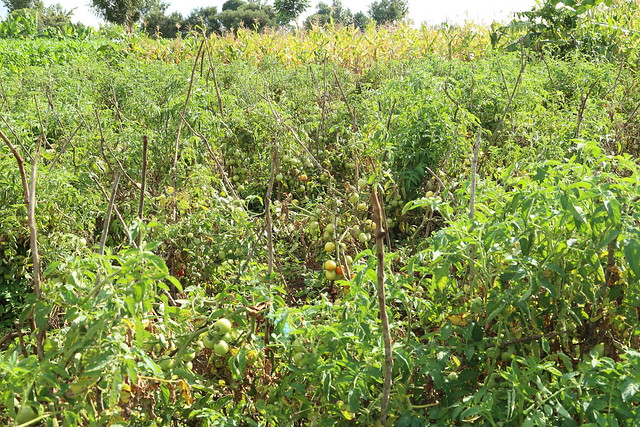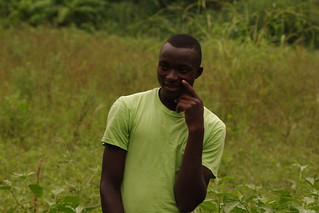No small change: Vegetable farmer cashes in on new vegetable varieties in Tanzania

By Andreas Gramzow, World Vegetable Center.
‘I grow vegetables because they provide ready cash for me and my family,’ says a beaming Hassan Saidi; one of the farmers who has benefited from activities led by the World Vegetable Center (AVRDC) under the Africa RISING-NAFAKA and TUBORESHE CHAKULA project for fast tracking delivery and scaling of agricultural technologies in Tanzania.
Saidi is 20 years old and lives in Maweni village, about 25 km east of Babati town in Tanzania. He has participated in the United States Agency for International Development (USAID) Tanzania mission-funded project since its inception in October 2014 and is finally reaping the benefits of making changes to his farming practices based on the advice of the project team.
Like the other 160 farmers trained by the project in April 2015 on vegetable garden establishment and maintenance, Saidi was also provided with an AVRDC vegetable seed pack with improved varieties to cultivate. His results have been impressive!
‘This is now the third time that I have reproduced my own vegetable seeds from the AVRDC varieties,’ he said. Out of the six varieties AVRDC has introduced to his village, he chose tomato (Tengeru 2010), African eggplant (DB3), and African nightshade (Nduruma).
‘These are the best I have ever grown. I don’t need any other crops. I was able to harvest 20 bags of African nightshade, where I previously produced only 1.5 bags. My tomato yields have doubled, and I am still harvesting African eggplant from the seed that I sowed half a year ago,’ he says. ‘Since I started with the AVRDC varieties eight months ago, my income has increased by more than TSH 400,000 (USD 190),’ explains Saidi.
Asked about the secret behind his exemplary success, he says the reasons are many but the main one is his use of the improved varieties from AVRDC. ‘But I also did other things like changing the spacing between seedlings. On the same plot (1/8 acre) where I sowed six lines of African nightshade before, I now sow only two lines. This is not to save seeds, but rather for disease control.’ As a result, Saidi now face much lower disease pressure and can harvest African nightshade for more than three months. Previously, he stopped harvesting after only one month because of pests and diseases. But now he even supplies African nightshade and African eggplant to other farmers and he hardly sprays any chemicals on tthe vegetables.
Saidi’s success has caught the attention of other farmers. Now the shy youthful farmer has a thing or two to teach his older neighbouring farmers. Perhaps his success can also just be the jolt his fellow youth need to get into farming. ‘My neighbours come to visit me regularly and are impressed by the crops they see on my plots,’ he says.

In a bid to improve his farm harvest, Saidi also experiments with different vegetable varieties. ‘I have established a separate one-acre plot on my farm, where I only grow AVRDC varieties and compare them with the local varieties grown on another plot in my farm. With the seeds I have produced from my first two harvests, I am also growing seedlings. Now my neighbors come and ask for seedlings and I give them some free of charge.’
This scaling project that brought success to Saidi and supports other vegetable growers in Manyara, Dodoma, Morogoro, and Iringa regions. Since the project started in October 2014, the implementing team has introduced improved agronomic practices and vegetable varieties to 12 villages in the four regions, trained 230 farmers and provided more than 800 farmers with AVRDC vegetable seed packs with improved varieties ready to be grown for home consumption and for sale in local and regional markets.




